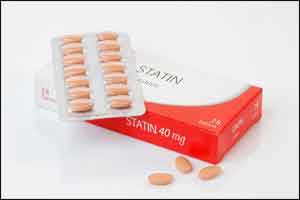- Home
- Editorial
- News
- Practice Guidelines
- Anesthesiology Guidelines
- Cancer Guidelines
- Cardiac Sciences Guidelines
- Critical Care Guidelines
- Dentistry Guidelines
- Dermatology Guidelines
- Diabetes and Endo Guidelines
- Diagnostics Guidelines
- ENT Guidelines
- Featured Practice Guidelines
- Gastroenterology Guidelines
- Geriatrics Guidelines
- Medicine Guidelines
- Nephrology Guidelines
- Neurosciences Guidelines
- Obs and Gynae Guidelines
- Ophthalmology Guidelines
- Orthopaedics Guidelines
- Paediatrics Guidelines
- Psychiatry Guidelines
- Pulmonology Guidelines
- Radiology Guidelines
- Surgery Guidelines
- Urology Guidelines
Statins in familial hypercholesterolemia: Early initiation leads to better CV outcomes finds NEJM study

Familial hypercholesterolemia is characterized by severely elevated low-density lipoprotein (LDL) cholesterol levels and premature cardiovascular disease.
Early initiation of Statins linked to better CV outcomes in familial hypercholesterolemia, finds a new study. Patients with Familial hypercholesterolemia who initiated statin therapy during childhood had a reduced risk for CVD later and slower progression of carotid intima-media thickness.The study showed Improved low-density lipoprotein levels and reduced cardiovascular event risk even after 20 years of statin treatment in children with FH. The findings of the study have been published in The New England Journal of Medicine.
Statins are the preferred drug therapy for familial hypercholesterolemia and both the European Atherosclerosis
But the long-term benefit of initiating early statin therapy in children with familial hypercholesterolemia (FH) is unknown.
The researchers analyzed data from 214 patients with familial hypercholesterolemia (FH) who were assigned statin therapy at age 8 to 18 years in a single-centre, double-blind, placebo-controlled trial that originally evaluated the efficacy and safety of pravastatin at 2 years. Most patients with FH (98%) were genetically confirmed as having the condition. Follow-up in the original study was conducted at a pediatric lipid clinic until patients transitioned to a general practitioner or adult lipid clinic.
The control group consisted of 95 siblings who were unaffected by FH.
Now, researchers have reported outcomes 20 years after statin therapy initiation at ages 8 to 18 years (mean age, 14 years) in 184 patients with FH. The mean age at follow-up was 32 years and the comparison groups were 77 unaffected siblings and 156 affected parents.
At a 20-year follow-up, the researchers found the following results.
- Most (79%) of the participants with FH reported still taking statins.
- Mean LDL cholesterol level was 161 mg/dL (down from 237 mg/dL at study start) compared with 121 mg/dL in unaffected siblings.
- Mean progression of carotid artery intima-media thickness was not different between participants with FH and their unaffected siblings.
- Among affected parents, 26% had a cardiovascular event prior to age 40 years, while 99% of the patients who began early statin therapy were free of cardiovascular events after 20 years of therapy.
- One participant with FH who discontinued statin therapy had an episode of angina pectoris requiring an intervention.
- Seven percent of affected parents died before age 40 years. No cardiovascular deaths occurred in the study group starting statins as children.
For further reference log on to:
Luirink IK et al. 20-year follow-up of statins in children with familial hypercholesterolemia. N Engl J Med 2019 Oct 17; 381:1547. (https://doi.org/10.1056/

Disclaimer: This site is primarily intended for healthcare professionals. Any content/information on this website does not replace the advice of medical and/or health professionals and should not be construed as medical/diagnostic advice/endorsement or prescription. Use of this site is subject to our terms of use, privacy policy, advertisement policy. © 2020 Minerva Medical Treatment Pvt Ltd